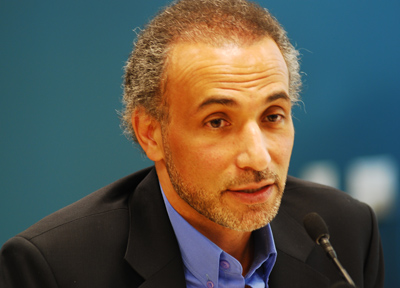
(RNS1-OCT1) Swiss scholar Tariq Ramadan says fellow Muslims should not to appear to take blame for terrorist attacks committed in the name of Islam by making concessions to their religious freedom, such as moving a planned Islamic community center proposed near Ground Zero. For use with RNS-MUSLIMS-BLAME, transmitted Oct. 1, 2010. RNS photo courtesy Pew Forum on Religion & Public Life.
(RNS) When will the blame game end?
That’s the question many Muslim Americans are asking, as controversies simmer over the role of Muslims in American public life, such as where they can pray, and how Islam is depicted in textbooks.
Many U.S. Muslims say the battles are not just about the right to practice their religion, but also about a lingering sense that they are, and will always be, held responsible for terrorist acts committed in the name of Islam.
Whether fellow Americans see them as distinct from Islamic terrorists will no doubt shape the future of generations of American Muslims.
Thus, for many Muslims, life in the U.S. requires maintaining a delicate balance between asserting their constitutional rights, getting along with fellow citizens, and distancing themselves from acts of terrorism — without seeming to accept blame for them.
For instance, agreeing to move Park51, the proposed Islamic community center near Ground Zero, is not just a matter of ceding religious rights, but also about accepting guilt for the actions of the 9/11 hijackers and other terrorists.
To be sure, not all Muslims feel that way.
Moving Park51, “does not mean we must accept the false premise that Islam is responsible for 9/11, and it does not mean sacrificing one’s rights to the populist, neoconservative and religious fundamentalist voices that seek to transform the issue into a new clash of civilizations,” wrote Tariq Ramadan, a controversial Swiss-Muslim scholar.
The differences are often generational.
“The people who seem to feel most uncomfortable with the idea of Park51 and feel some collective guilt for a lot of the violence that’s happening tend to be the first generation immigrants,” said Ameena Meer, who lives near Ground Zero and was two blocks from the first tower when it fell. She believes the proposed Islamic center should not be moved, and has started a Facebook in support of the project. Her mother disagrees.
“In my mom’s mind, it would be like stopping all the drama. But in my mind, moving it would be, one, an admission of guilt, and two, it wouldn’t solve anything,” said Meer.
This concern has been prevalent on Muslim blogs and Internet chat rooms, and in newspaper articles and interviews.
Mongi Dhaouadi, president of the Connecticut chapter of the Council of American-Islamic Relations, said he fought a decision by the president of the Hartford City Council to uninvite two imams from praying before council meetings after citizens protested.
“You’re caving in to people who say all Muslims are complicit in 9/11, and you’re giving legitimacy to that view,” said Dhaouadi. “We can’t accept this.”
Council president rJo Winch said she had no intention of assigning collective guilt to Muslims, but was respecting opposition views, even if some were intolerant.
Other Muslims believe they can reject collective responsibility but feel guilt individually.
“Allah makes it real clear that we’re stuck with each other, like family,” said S.E. Jihad Levine, a blogger and journalist who was raised Jewish but converted to Islam in 1998. “You may not like your brother or your sister or your uncle, but they’re blood. And when you’re Muslim, how could you not help but feel any guilt, with what some of these Muslims do?”
Observers say collective guilt of Muslims has been amplified by the wars in Afghanistan and Iraq, as well as terrorism threats coming from other Muslim countries, from trouble spots like Somalia and Yemen, to more stable but authoritarian countries like Saudi Arabia, Libya and Egypt.
“The stereotypes must be recognized and deconstructed through education and enforcement of civil rights,” said Sahar Aziz, a civil rights lawyer in Austin, Texas. “The bias held by portions of the public is fueled and justified when they see their government mistreating Muslim Americans.”
Collective guilt is a question that has challenged different countries for centuries, from Germans and Japanese after World War II to Serbs and Hutus more recently. Some foreign policy experts have noted that one of Americans’ biggest enemies — Osama Bin Laden –ascribes guilt to all Americans for the perceived crimes of America against Muslims.
Despite the current difficulties, Meer said she does not fear for her daughters’ future in the U.S. “I believe that it’s temporary, and also because I believe, when push comes to shove, most Americans are pretty tolerant.”
Levine, who said she has experienced harassment as a Jew and as a Muslim, isn’t so sure. “It causes a little fear in me. I definitely have my passport current,” she said. “When something else happens here, it’s not going to be pretty.”
The only way for Muslims to fight collective guilt, Levine said, is to get out in their communities so people know them as individuals. “When the Holocaust went down, a lot of non-Jews helped us, and that’s because they knew us,” she said. “In America, rational voices have always won out, and that’s my hope.”




